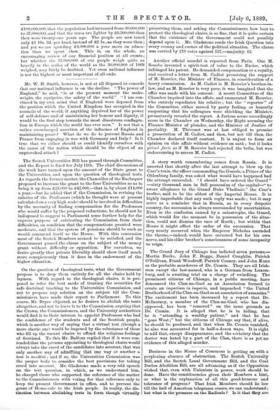On the question of theological tests, what the Government propose
is to drop them entirely for all the chairs held by laymen. With regard to the theological chairs, it is pro. posed to refer the best mode of treating the securities for safe doctrinal teaching to the Universities Commission, and not to propose any solution on the subject till the Com- missioners have made their report to Parliament. To this course Mr. Bryce objected, as he desires to abolish the tests altogether, and not to leave it to the Commission, arguing that the Crown, the Commissioners, and the University authorities would find it to their interest to appoint Professors who had the confidence of the students and of the Scottish people, which is another way of saying that a virtual test (though a more elastic one) would be imposed by the reluctance of those who fill up the vacant chairs to offend the religious feelings of Scotland. To this Mr. Balfour replied that if it were con- tended that the persons appointing to theological chairs would always take the creed of the candidates into account, that was only another way of admitting that one way or another a teat is needful ; and if so, the Universities Commission was • the proper body to consider the best provisions for taking creed into account. Mr. Gladstone made a very odd speech on the test question, in which, as we understand him, he charged those who supported the reference of the matter to the Commissioners with voting for that reference only to .keep the present Government in office, and to prevent the grant of Home-rule to the Irish people. In reality, the dis- tinotion between abolishing testa in form though virtually preserving them, and asking the Commissioners how best to. protect the theological chairs, is so fine, that it is quite certain that the existence of the Government could not possibly depend upon it. Mr. Gladstone reads the Irish Question into every cranny and corner of the political situation. The clause- was carried by 219 votes against 157,—majority, 62.










































 Previous page
Previous page